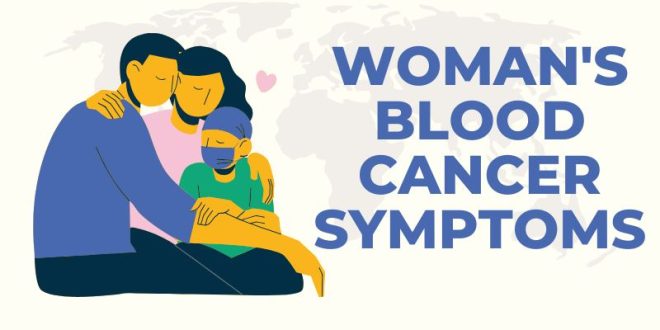Blood cancers, including leukemia, lymphoma, and multiple myeloma, can manifest a variety of symptoms that may differ between individuals. Understanding these symptoms is crucial for early detection and treatment. Here’s an overview of the common symptoms associated with blood cancer, particularly in women, along with insights into their significance.
Understanding Blood Cancer
Blood cancer arises from the uncontrolled growth of blood cells, primarily affecting the bone marrow, lymphatic system, and blood. The most common types include:
- Leukemia: Affects the bone marrow and blood, leading to the production of abnormal white blood cells.
- Lymphoma: Affects the lymphatic system, where lymphocytes (a type of white blood cell) become malignant.
- Multiple Myeloma: Involves plasma cells in the bone marrow, affecting the production of antibodies.
Common Symptoms
1. Fatigue
One of the most prevalent symptoms of blood cancer is persistent fatigue that does not improve with rest. This fatigue can stem from the body’s inability to produce healthy blood cells, leading to anemia, which reduces the oxygen supply to tissues and organs.
2. Frequent Infections
Blood cancers often compromise the immune system, resulting in an increased susceptibility to infections. Women may notice they catch colds or other infections more frequently, and these infections may be harder to shake off.
3. Unexplained Bruising or Bleeding
Easy bruising or excessive bleeding from minor cuts is a common symptom. This occurs due to a low platelet count (thrombocytopenia), which affects the blood’s ability to clot. Women might experience heavier menstrual bleeding or prolonged bleeding during or after surgery.
4. Swollen Lymph Nodes
Swollen lymph nodes, particularly in the neck, armpits, or groin, can indicate lymphoma. These swollen areas may be painless and can fluctuate in size. It’s important to monitor these changes, especially if they persist over time.
5. Weight Loss
Unexplained weight loss is often a significant indicator of serious health issues, including blood cancer. Women may notice they’re losing weight without trying, which can be associated with the body’s increased energy expenditure due to the cancer or the cancer’s impact on appetite.
6. Night Sweats
Excessive sweating at night, often soaking through bed sheets, can be another sign of blood cancer, particularly lymphoma. This symptom can occur without fever and is usually coupled with an underlying infection or malignancy.
7. Fever
Recurrent or persistent fevers without an obvious cause can be linked to blood cancer. This may be a response to the body fighting off cancer or infections. Women experiencing prolonged fevers should consult a healthcare provider.
8. Bone Pain
Pain in the bones or joints is often associated with blood cancer, particularly in multiple myeloma. This pain occurs due to the proliferation of cancerous cells in the bone marrow, leading to discomfort and pressure on surrounding areas.
9. Shortness of Breath
Due to anemia or infections, women with blood cancer may experience difficulty breathing, especially during physical activity. This symptom can occur if the cancer affects the production of red blood cells, which carry oxygen throughout the body.
10. Changes in Skin Color
Pale or sallow skin can indicate anemia, while dark patches or unusual rashes can signal more advanced disease or other related issues. Women may notice their skin appears less vibrant, which can be a sign of an underlying blood disorder.
Emotional and Psychological Symptoms
In addition to physical symptoms, blood cancer can also take a toll on mental health. Anxiety, depression, and feelings of helplessness can arise from the challenges of coping with a cancer diagnosis. Women may experience mood swings or changes in emotional well-being, necessitating support from mental health professionals or support groups.
Importance of Early Detection
Recognizing these symptoms early is vital for improving outcomes. Women who notice persistent or unexplained symptoms should consult a healthcare provider for evaluation. Diagnostic tests, such as blood tests, bone marrow biopsies, and imaging studies, can help confirm or rule out blood cancer.
Risk Factors and Prevention
While the exact causes of blood cancer are often unknown, certain risk factors may increase susceptibility:
- Genetic Factors: A family history of blood cancers can raise an individual’s risk.
- Age: While blood cancers can occur at any age, the risk increases as one gets older.
- Exposure to Chemicals: Certain chemicals, such as benzene, and radiation exposure have been linked to blood cancers.
- Immune System Disorders: Conditions that weaken the immune system can increase the risk of developing blood cancers.
Conclusion
Blood cancer symptoms in women can be diverse and subtle, often overlapping with other health issues. Being aware of these signs is crucial for early diagnosis and intervention. Regular health check-ups, a healthy lifestyle, and open communication with healthcare providers can empower women to take charge of their health and seek necessary evaluations promptly.
For those experiencing any of the symptoms mentioned, it’s essential to reach out to a healthcare professional for guidance and potential testing. Early detection can significantly improve the prognosis and quality of life for those affected by blood cancers.
Read more – (Click here)
 Diverse Perspectives: Insights & Stories Exploring Ideas, Sharing Knowledge
Diverse Perspectives: Insights & Stories Exploring Ideas, Sharing Knowledge





